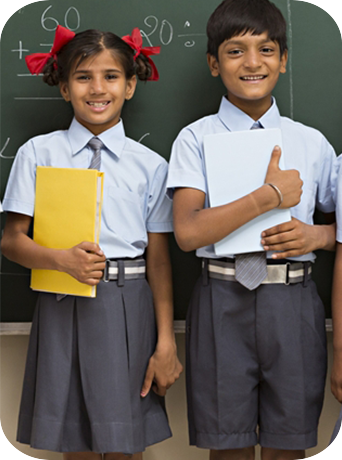School of Education Vision Statement Students of Masterminds Group of Schools continually examine what, how, why and who they teach. They embody compassion, empathy and respect for what every individual brings to the learning experience. They believe that all students can learn and that students’ learning potential is unknown and not pre-determined. They believe that the goal of the teacher is to develop students’ minds as powerful thinkers and problem-solvers. They view education as a profession in which practice and theory interact continually and dynamically to guide curriculum, pedagogy, and educational leadership. School of Education Mission Statement The School of Education prepares highly qualified, caring, and effective educators to meet the needs of students in diverse settings within the State of A.P and beyond. We do so by linking theory, scholarship, and social justice. Our programs emphasize equity, academic excellence, reflective practice, curriculum integration, and advocacy. The programs promote meaningful fieldwork in which pre-service and in-service teachers engage with students, families, and other educators within diverse communities. Our students conduct research, understand educational policies, and develop the skills required to meet the needs of all students. Through their courses and fieldwork, our students develop the dispositions that guide and support their teaching and leading. School of Education Goals To actualize our vision and mission, we engage with our students in the classroom and in the field to: Truly listen to one another and see the world from different perspectives. Recognize how race, ethnicity, class, gender, family, and context shape human values and experience. Understand the relationship between students’ academic achievement and their emotional well-being. Demonstrate dexterity in their use of curriculum theory, pedagogy, and assessment practices. Create classroom environments that respect all students and meet the needs of all learners. Conduct research with students, educators and school communities to generate new knowledge and strategies that contribute to the field. Critically analyze and thoughtfully engage in conversations around current educational policies that impact teaching and learning in classrooms. Develop professional dispositions that help them to recognize and utilize the “funds of knowledge” of culturally and linguistically diverse families and communities. Teach and lead in a wide range of local, state, regional, national, and international settings. See below for specific discipline Mission Statements. Goals and Objectives of the Conceptual Framework In order to achieve our primary purpose of preparing educators who possess intellectual autonomy and professional responsibility, our work centers on three goals and their respective objectives: Goal 1: Gain Content Knowledge and Develop Pedagogy - Acquire an understanding of subject matter across the curriculum and apply it in pedagogically appropriate ways. Objective A: Knowledge of Subject Matter. Demonstrate an understanding of the discipline, its central concepts, principles, and processes of inquiry. Outcome - Demonstrate breadth, depth, and accuracy of knowledge in the content area. Objective B: Knowledge of Pedagogy. Design and implement instruction that demonstrates an understanding of the discipline, its central concepts, principles, and processes of inquiry. Outcome - Present subject matter to others in effective, concrete, and conceptual terms. Objective C: Knowledge of Learners. Demonstrate knowledge about child or adolescent development. Outcome 1 - Demonstrate knowledge of cognitive styles and abilities Outcome 2 - Demonstrate knowledge of recognition of a variety of characteristics of children (e.g., culture, language, family). Goal 2: Engage All Students - Design and implement instruction that motivates and engages all students. Objective A: Skill of Planning. Plan instruction using various strategies that reflect an understanding of the cognitive, affective, and physical characteristics of each learner. Outcome 1 - Develop lesson plans, including attention to planning for diverse learners. Outcome 2 - Integrate ongoing, short-term plans with long-term goals and learning objectives that meet state standards. Outcome 3 - Consider alternatives in the event that the plan needs adjusting. Objective B: Skill of Teaching. Implement effective teaching/learning strategies. Outcome 1 - Effective use of a variety of teaching methods. Outcome 2 - Implement and modify instructional strategies that promote cognitive, social, and personal development of all students. Outcome 3 - Accept and incorporate students' ideas and questions into the lesson. Outcome 4 - Integrate technology into the curriculum. Objective C: Skill of Effective Classroom Management. Encourage respectful behavior from students. Outcome 1 - Use effective classroom management techniques. Outcome 2 - Create a learning environment that encourages positive interactions. Outcome 3 - Encourage responsibility and leadership. Objective D: Skill of Assessment. Assess the relationship between instruction and student learning and adopt assessment practices that result in meaningful feedback and student accountability for learning. Outcome 1 - Select and administer a variety of assessment tools. Outcome 2 - Use initial and ongoing assessment to guide instruction. Outcome 3 - Use assessment information to identify supports and adaptations. Outcome 4 - Use information from multiple assessments to measure instructional impact over time and make necessary adjustments to instruction. Goal 3: Demonstrate Professional Dispositions - Conduct oneself in contextually appropriate ways. Objective A: Reflective Practice. Demonstrate continuous evaluation and monitoring of informed practices. Outcome 1 - Demonstrate purposeful self-reflection (e.g., using journals, portfolios) to enhance students’ cognitive, social, and personal development. Outcome 2 - Demonstrate purposeful self-reflection to advance teacher identity. Objective B: Collaboration. Engage jointly with other professionals in reflective practice. Outcome 1 - Participate jointly in professional activities. Outcome 2 - Communicate and collaborate with P-12 students, colleagues, parents, agencies, and the larger community. Objective C: Respect for Others. Develop positive school climates that reflect openness, mutual respect, support, and encourage inquiry. Outcome 1 - Respect the rights and responsibilities of individuals in a democratic society. Outcome 2 - Respect cultural, familial, and linguistic diversity. Outcome 3 - Respect colleagues, family, and community members.

.jpg)

Nursery
LKG
UKG
1st Standard
2nd Standard
3rd Standard
4th Standard
5th Standard
6th Standard
7th Standard
8th Standard
9th Standard
10th Standard

 Contact Address
Contact Address
